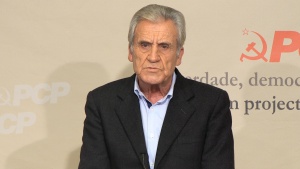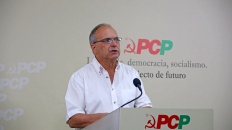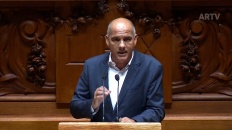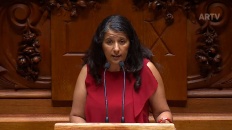After a long period with schools closed last year, the return to face-to-face teaching at the beginning of the present school year was a decisive step towards normalizing the teaching/learning process and enhancing the recovery of delays in the previous year.
Only in this way was it possible to guarantee that no student would be conditioned in monitoring the subjects taught, contrary to what had happened with a very significant percentage in the previous school year. A school year that the educational community in general evaluated negatively.
The government's decision to interrupt the school year for 15 days from 22 January had the aim, as has been proven, to adapt and prepare schools for distance learning.
At the time, the PCP made it clear that it was not opposed to a decision based on public health reasons, demanding that this decision be limited to the time strictly necessary, ensuring that all safety conditions were met for students and workers involved in education.
Although not declared, the government's intention was to close schools and start distance learning for all school years, a measure that, as all indications suggest, will extend until the end of March, according to the announcement made by the Prime Minister at the last meeting held at Infarmed.
If confirmed, this decision will have particularly negative consequences, both in the school career and in the learning of more than 1.2 million children and youth, as well as in the social and health fields in general.
The closure of schools in two consecutive school years, in addition to the consequences mentioned, will heighten the existing inequalities, raise problems in terms of the socialisation of children and youth and contribute to the degradation of their mental and physical health. Problems that the government cannot ignore, since they have been the subject of several interventions by the educational community and the PCP, as well as several warnings by the National School of Public Health, which has consistently pointed out the impacts on the mental health of the young.
The closure of schools, as the PCP has stated, will heighten inequalities, with many of the students becoming conditioned in the monitoring of the subjects taught because they do not have access to the required technical conditions and many others without the necessary help from parents in monitoring the study.
The previous experience tells us that more than 30% of the students did not have access to the contents delivered and, therefore, it was impossible for teachers to teach part of the curricula.
Today, with the school year already started, there are several problems that families are faced with:
- Tens of thousands of computers are yet to be distributed;
- Parents who have to stay at home with their children and who are therefore faced with a cut of one-third of their wages, at a time when household expenses are increasing;
- A more serious situation when parents are teleworking and have to “reconcile” it with caring for the children, an impossible juggling and the dramatic consequences that have been known from previous experiences. Furthermore: if one parent is teleworking, the other cannot activate assistance for the child.
In the current context of an economic crisis that is brutally affecting thousands of families, the government should consider the free distribution of computers with Internet access to all students in compulsory education, as is already the case with textbooks.
Three days after the start of distance learning, the situation is marked by a very significant percentage of students who, faced with the lack of means or capacity to access the contents and the fact that they are part of families with a lack of conditions to support them, will certainly suffer consequences in terms of dropping out of school, a regression from the positive evolution of school success that the country has been witnessing.
The situation requires the government to reconsider the previous decision and give full wages to the parents of children up to the age of 16 who have to stay at home to accompany their children and that teleworkers can also activate the child support mechanism. .
At various times, we have drawn the government's attention to the many concerns we have about the lack of resources available in schools to monitor students with Special Educational Needs, particularly those who need additional measures and who will remain in schools. Schools where teachers and other specialized technicians are in shortage. Children and young people at risk who have been severely affected over the years and also with distance learning in the 2020/2021 school year, which is why the government must assume without economic-based concerns the hiring of professionals and the means to overcome these difficulties.
The PCP reiterates that it is necessary to guarantee the return to classroom teaching as soon as possible. Extending the closure of schools causes serious problems for the full development of children and youth, and this must be a central problem for society.








